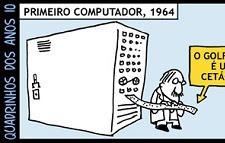Francis Bacon, On Seeming Wise, early 1600's: It is a Ridiculous Thing, and fit for a Satyre, to Persons of Iudgement, to see what shifts these Formalists haue, and what Prospectiues, to make Superficies to seeme Body, that hath Depth and Bulke.[I have put the whole essay
below.]
or
Unde Malum? / Whence evil?Up, Down, Appendices, WTF?!.
Superficies from Latin 'facies', face or visage. Change one letter, a few letters, not far anyway, to get to fæces, feces; iShit ... and 'I, FAECES!' (spoken in bold caps like an Emperor).
A long time ago I went to the trouble of learning what 'theodicy' means; studied the book of Job (with a retired priest who had gout and a good sense of humour) and so on ... here, check it out at Wikipedia if you're not quite sure.[But when Simon Critchley uses the word on page 102 (see paragraph below), "... and no appeal to any political theodicy or philosophy of history ..." I'm goin' "WTF?!"]
Unde Malum? is every bit as pretentious, precious, just as over-nice, and leaves God out of it - less problematic.
 Do not recharge cellular batteries for the animals.
Do not recharge cellular batteries for the animals. [From
Allan Sieber.]
When I get an email with a little footnote that says "Sent from my iPad," or "Sent wirelessly from my BlackBerry device," I sometimes send back this YouTube video from Mad TV.
There does seem to be a way for users of these things to turn off the footnote feature, a way of hiding it (and shame is telling); but even without the footnote I mostly know when a message coming to me has been composed with thumbs - and I don't like it.
Oh sure, I still read them, do my best to respond ... I guess it should come as no surprise that these conversations generally go nowhere. But it is a surprise, every time, and it's always a let down, a disappointment.
A surprise too to find the NYT liberals supporting the sweatshops as an inevitable stage of development or some such rot, but let that be.
What I don't get wrong I get skewed; and what I don't get wrong or skewed is trivial - must'a begun that time I followed after the Troll King's daughter ...
The introductory diagram is just that, introductory; not jist nor heft nor none of that.
And having gone to the publisher's site: Verso Books, and followed the 'Purchase' link, I find reasonable ($15) paperback copies of 'Infinitely Demanding: Ethics of Commitment, Politics of Resistance', and hardcover ($25) with free delivery, anywhere, all the time, at The Book Depository (Gloucester, England).
Then, somewhere early in Chapter 4 it descends into Chinese ... (no disrespect to the Chinese, it's a figure of speech) Initially, hegemony means leadership of a class alliance, exemplified in the Russian revolutions of 1905 and 1917, where the proletariat became hegemonic. Yet, this is not an economic or economistic alliance, but the construction of a system of political alliances, what Laclau calls a 'chain of equivalences'. The meaning of hegemony is expanded to include cultural, moral and ideological leadership over allied subordinate groups, the formation of a new ideological terrain, a new space of myth in the sense of Georges Sorel. Such hegemony has to be based on consent, it has to be the cultivation of a habitus. Originally, the concept of hegemony derives from linguistics (Gramsci's unfinished university thesis was in linguistics), meaning the influence or prestige of one language over another, for example the increasing hegemony of Spanish over English in the USA. Hegemony is active, dynamic and changing, as opposed to the static model of subordination implied by the model of a dominant ideology. It is the cultivation of the art of government amongst the subaltern classes.
For Gramsci, hegemony is the activity of the formation of 'collective will' out of the divergent groupings that make up civil society, but it is still deeply anchored in the fundamental Marxist dialectical contradiction of forces and relations of production. For Laclau, the concept of hegemony is freed from this contradiction and expanded to designate the general logic of the political institution of the social. The task of hegemony is the cultivation of forms of commonality, of habits, customs and a whole ethos of what Gramsci calls 'common sense'. This is the role that Gramsci assigns to what he calls 'philosophy of praxis', which is both his code in the Prison Notebooks for Marxism and a critique of the latter insofar as Marxism should not present itself as an abstract theory, but should enter into and, in turn, shape common sense. Hegemony is the construction of chains of equivalence, of political alliances between often quite disparate groups, based on consent and local, situated forms of commonality.
The ever-widening dislocations of an increasingly brutal and far-reaching capitalism do not, however, entail political pessimism, as is the case for an Adorno or a Heidegger from opposite sides of the philosophical looking-glass. On the contrary, such dislocations can (I emphasize 'can' as there is no necessity to this operation and no appeal to any political theodicy or philosophy of history) be linked to the emergence of a range of alternative political possibilities opposed to capitalism and are thus, as Laclau says, the condition for 'a new militancy and a new optimism'. He writes:The fragmentation and growing limitation of social actors is linked to the multiplication of the dislocations produced by 'disorganized capitalism'. It follows from this that more and more areas of social life must become the product of political forms of reconstruction and regulation.
The radical and perhaps disquieting thought here is for a co-implication of the dislocatory force of capitalist globalization, a multiplication of social actors and, thus, of political possibility. This co-implication can lead to the emergence of an alternative left, but this is a hegemonic operation, it is a construction, it is political work that needs to be done. All of which has significant implications for our thinking of the subject of politics, as we will now see.
... and I lose the plot.
Twenty pages further on something seems to emerge (as I knew it had to since I already skipped on ahead and read the ending); but something has changed in the 'praxis', in the zeitgeist, in the 'umwelt' the 'surround' and I am lost. What climbs out is slimy & dripping from the swamp, stinking ... There! I've gone and lost the mood too.
It does come back on track, sort of; the turgid prose reasserts, tumescence is re-established ... but there has now been somewhat of a hiatus while I re-read those twenty or so pages several times trying to figgure out what 'political theodicy' might be (among other things), so I will say some more about this book sometime later on when I have my own copy (which I can mark up at will - and now that the fnord alarm is on hair-trigger it is goin' off all'a time, seems like every page).

 Looking for videos of Simon Critchley led me to Histories of Violence, a website with some excellent (but not very accessible) videos of the likes of Noam Chomsky, and yes, Simon Critchley. But the site is confusing, flash videos starting up all over the place with no rhyme nor reason; so I was accidentally, inadvertently, treated to an introduction to this Polish guy, Zygmunt Bauman, and hints of answers to some questions which have been in my revolving file for most of my life.
Looking for videos of Simon Critchley led me to Histories of Violence, a website with some excellent (but not very accessible) videos of the likes of Noam Chomsky, and yes, Simon Critchley. But the site is confusing, flash videos starting up all over the place with no rhyme nor reason; so I was accidentally, inadvertently, treated to an introduction to this Polish guy, Zygmunt Bauman, and hints of answers to some questions which have been in my revolving file for most of my life.
"The unspoken terror permeating our collective memory of the Holocaust is the gnawing suspicion that the Holocaust could be more than an aberration, more than a deviation from an otherwise straight path of progress," he says. (Though I sure don't want the 'straight path of progress' neither ... well, he's a sociologist, and he is old enough and meanders enough that it balances out somehow.)
 The site is that disorganized that I cannot provide a link to what I saw there - so go, poke around a bit and maybe it will fall on you too.
The site is that disorganized that I cannot provide a link to what I saw there - so go, poke around a bit and maybe it will fall on you too.
He has written a book: Modernity and the Holocaust, 1989 revised 2000, which is now being 'held' at the library and which will come along after a while - something to look forward to.
The holocaust has been an ongoing meditation for many in my generation. I have now made a tag to begin to track references - since the basic Google Search engine just has no idea. One of them is here.
[Damned Google Search (!) Useless! It was ten minutes of concentrated effort to find that last reference - and I knew with some certainty that I thought it was definitely there somewhere.
And after all the hoopla around the recent Google 'changes' I still can't permanently turn off their fucking Safe Search filters & Instant predictions - BOLLOCKS!
Or here: write an algorithm, a loop that will turn "1, 2, 3, 4, 5" into "4, 3, 2, 1, 5" (which is what the Google image uploader does) - if you are any kind of a programmer this exercise should be both somewhat difficult, and distasteful.
A-and SOPA & PIPA, passed or not, are working their evil magic already anyway - you can feel the taps being slowly turned off at isoHunt & Demonoid - squeak, squeak, squeak - downloading movies will soon be a thing of the past.]
Mike Daisey, 'Mr. Daisey and the Apple Factory':
| He's a good storyteller, an hour well spent: This American Life #454, Mr. Daisey and the Apple Factory, aired January 6 2012: details, podcast, and downloadable mp3 here. |   | The story takes place in Shenzhen China (map). I found it here. It's now on stage as 'The Agony and the Ecstasy of Steve Jobs'; here's a review. |
That said, there is this (another hour or so which I did not have the patience to watch all of): Sleeping with the Enemy at the 2011 Festival Of Dangerous Ideas in Sydney. In the first few seconds you can hear him breathing ... he is afraid. Of what?
Maybe it's an American thing that one is ruined by the least rumour of conventional success. There are clues, even in the one I liked - his relationship with the hired translator is ambivalent, unresolved. Time will tell.
[I thought, what the hell, two images looking out like Janus - he's sort'a Roman-looking this guy, why not put 'em in the middle side-by-each? Well, HTML is why not.]




 Everybody's seen this right? February 1 1968: South Vietnamese General Nguyen Ngoc Loan and Nguyen Van Lem on a Saigon street early in the Tet Offensive; by Eddie Adams.
Everybody's seen this right? February 1 1968: South Vietnamese General Nguyen Ngoc Loan and Nguyen Van Lem on a Saigon street early in the Tet Offensive; by Eddie Adams.[I am not a big fan of
Latuff - his takes on things too often seem facile (talk about the pot & the kettle!) but I came across his photoshopped image of the General shooting Nguyen smerged with Coke - and that's how this bit got started.]

 And this one? June 8 1972: Kim Phuc runs down Route 1 near Trang Bang, Vietnam after an aerial napalm attack; by Nick Ut.
And this one? June 8 1972: Kim Phuc runs down Route 1 near Trang Bang, Vietnam after an aerial napalm attack; by Nick Ut.
[Not very often I expurgate around here; but there you go - don't click on the thumbnails unless you want to see the images - they are, like the man says, "disturbing".]
These artists, Latuff, Banksy, a host of others, are clearly raging; but they are on the margins, marginalized, discredited, pooh-pooh-ed (and also through whatever internal mechanisms may be going on - most evident in the case of Latuff) - and yet, it seems to me that their visions are 100%. Easy to compare, say, Mike Daisey & Michael Moore f'rinstance - they're both 'large' for one thing ... in my mind Michael Moore isn't even an 'also ran'.
So.
A side of botany, biology, physiology, evolution, with that?
 Someone said to me last week that though there is neither remedy nor cure for despair, there can be care and comfort. These are necessarily communal and collective therapies, aren't they? Somehow establishing the social solidarity to short-circuit the repetitive playing out of traumas - and a hook, a segue, into Gabor Maté's notions of addiction too.
Someone said to me last week that though there is neither remedy nor cure for despair, there can be care and comfort. These are necessarily communal and collective therapies, aren't they? Somehow establishing the social solidarity to short-circuit the repetitive playing out of traumas - and a hook, a segue, into Gabor Maté's notions of addiction too.
Where is this solidarity to be found then? I bin lookin' for it and I ain't seen none no where.
I have started using Bing more often, and for a few days their splash screen had the image on the left of Licmophora flabellata, a colonial Diatom (diatoms are phytoplankton, roughly 'tiny marine plants').
I knew two botanists at McGill whose research focus in those days was Volvox, a colonial green algae, fresh water, but the individuals are flagellates (they get around by whipping a tiny hair that comes of of one end of 'em) so in some ways they ressemble animals.



 We learned (incidentally) how to smuggle specimens back from Haiti & Cuba - but the big question was how and why individuals of species such as Chlamydomonas would aggregate in this way?
We learned (incidentally) how to smuggle specimens back from Haiti & Cuba - but the big question was how and why individuals of species such as Chlamydomonas would aggregate in this way?
There are similar (though larger since two species are involved) questions around composites like Lichens (algae + fungus) and Corals ('animal' + algae).
And there's lots that can be said in answering these questions without straying too far into teleological territory - though really, it's almost inevitable to go there isn't it?
 This species, L. dalmatica, seems to show an earlier stage, less integration, individual stalks. Is that why they appear more rounded I wonder? I put several images of L. flabellata (above) for two reasons: one, to show how images you find on the Internet may be changed, may 'lie' in a sense, be the same but ... different; and, two, to try to see more of the connecting structure.
This species, L. dalmatica, seems to show an earlier stage, less integration, individual stalks. Is that why they appear more rounded I wonder? I put several images of L. flabellata (above) for two reasons: one, to show how images you find on the Internet may be changed, may 'lie' in a sense, be the same but ... different; and, two, to try to see more of the connecting structure.
What I was thinking about the whole time was Zygmunt Bauman's insights into human behaviour. No good in underestimating conformity, self-interest, complacency, inertia, nor in underestimating physiology either.
Until this fellow started talking to me about care, well, the only ways out of the cul-de-sac that I could even conceive of, visualize, were transcendence, sublimation, 'love is not love which alters when it alteration finds' ... and pornography of course.
 These pretty young women all work for a porn website. Apparently they also socialize, or at least that is what this picture would suggest. It's all staged, sure it is, but they look happy. Can you fake that kind of appearance I wonder? Probably - though there are miles of middle ground in every corporate relationship eh?
These pretty young women all work for a porn website. Apparently they also socialize, or at least that is what this picture would suggest. It's all staged, sure it is, but they look happy. Can you fake that kind of appearance I wonder? Probably - though there are miles of middle ground in every corporate relationship eh?
Is this what solidarity looks like then? Is this an example?
[Eventually I guess someone will slap a rating on this blog. Oh well. If it has 'adult' in it I will put it on my resumé.
Turns out (in the OED) that 'fesses' is another synonym for shit (along with faeces) - so here, by accident not design, is one'a them literary Victorian arch structures to wrap this up for y'all.]
Quelle est la différence entre une jeune religieuse et une vielle religieuse? ... Il y en a plusieurs mais la principale est que la jeune est folle des messes et que la vieille est molle des fesses.
Be well gentle reader.
WTF?! How can this kind of nonsense still be going on?!
I read about it in the Guardian; the two articles are below:
No Need to Panic About Global Warming.
Check With Climate Scientists for Views on Climate.
 Rupert Murdoch owns the Wall Street Journal apparently and Rupert Murdoch is a baaad person, everyone knows that already don't they?
Rupert Murdoch owns the Wall Street Journal apparently and Rupert Murdoch is a baaad person, everyone knows that already don't they?
Rupert Murdoch did not write the article; he did not directly manage the writing, sign the cheque to pay the writer; answer the telephone for either the manager or the writer ... it took a small army to produce that article. How far up their asses have they all got their heads then the people in that army? Nevermind Rupert Murdoch - he's done for.
[Having already concluded with end-of-the-rainbow images of faces faeces & fesses ... there we went again gentle reader, another Victorian arch - call it 'almost-a-hat-trick'.]
FUCK OFF WITH THIS FUCKING SHITE!
Appendices:1. Of Seeming Wise, Francis Bacon, early 1600's.
2. No Need to Panic About Global Warming, Wall Street Journal, January 27 2012.
3. Check With Climate Scientists for Views on Climate, Wall Street Journal, February 1 2012.
Of Seeming Wise, Francis Bacon, early 1600's.
There are lots and more versions of this short essay on-line ... each a little different. What is below is what looks to me like about the original from
UofT, with the latin translated in []'s from
Bartelby.
Honourable mention: at
Google Books,
Internet Archive, and,
Gutenberg.
Of Seeming Wise.IT hath been an Opinion, that the French are wiser then they seeme; And the Spaniards seeme wiser then they are. But howsoeuer it be between Nations, Certainly it is so between Man and Man. For as the Apostle saith of Godlinesse; Hauing a shew of Godlinesse, but denying the Power thereof; So certainly, there are in Point of Wisedome, and Sufficiency, that doe Nothing or Little, very solemnly; Magno conatu Nugas [with great effort, trifles]. It is a Ridiculous Thing, and fit for a Satyre, to Persons of Iudgement, to see what shifts these Formalists haue, and what Prospectiues, to make Superficies to seeme Body, that hath Depth and Bulke. Some are so Close and Reserued, as they will not shew their Wares, but by a darke Light; And seeme alwaies to keepe backe somewhat; And when they know within themselues, they speake of that they doe not well know, would neuerthelesse seeme to others, to know of that which they may not well speake. Some helpe themselues with Countenance, and Gesture, and are wise by Signes; As Cicero saith of Piso, that when he answered him, he fetched one of his Browes, vp to his Forehead, and bent the other downe to his Chin: Respondes, altero ad Frontem sublato, altero ad Mentum depresso Supercilio; Crudelitatem tibi non placere [You answer, with one eyebrow lifted to the forehead and the other lowered to the chin, that cruelty does not please you]. Some thinke to beare it, by Speaking a great Word, and being peremptory; And goe on, and take by admittance that, which they cannot make good. Some, whatsoeuer is beyond their reach, will seeme to despise or make light of it, as Impertinent, or Curious; And so would haue their Ignorance seeme Iudgement. Some are neuer without a difference, and commonly by Amusing Men with a Subtilty, blanch the matter; Of whom A. Gellius saith; Hominem delirum, qui Verborum Minutijs Rerum frangit Pondera [A foolish man, that with verbal points and niceties breaks up the mass of matter]. Of which kinde also, Plato in his Protagoras bringeth in Prodicus, in Scorne, and maketh him make a Speech, that consisteth of distinctions from the Beginning to the End. Generally, Such Men in all Deliberations, finde ease to be of the Negatiue Side; and affect a Credit, to obiect and foretell Difficulties: For when propositions are denied, there is an End of them; But if they be allowed, it requireth a New Worke: which false Point of Wisedome, is the Bane of Businesse. To conclude, there is no decaying Merchant, or Inward Beggar, hath so many Tricks, to vphold the Credit of their wealth, as these Empty persons haue, to maintaine the Credit of their Sufficiency. Seeming Wise-men may make shift to get Opinion: But let no Man choose them for Employment; For certainly, you were better take for Businesse, a Man somewhat Absurd, then ouer Formall.
No Need to Panic About Global Warming, Wall Street Journal, January 27 2012.
There's no compelling scientific argument for drastic action to 'decarbonize' the world's economy.Editor's Note: The following has been signed by the 16 scientists listed at the end of the article:
A candidate for public office in any contemporary democracy may have to consider what, if anything, to do about "global warming." Candidates should understand that the oft-repeated claim that nearly all scientists demand that something dramatic be done to stop global warming is not true. In fact, a large and growing number of distinguished scientists and engineers do not agree that drastic actions on global warming are needed.
In September, Nobel Prize-winning physicist Ivar Giaever, a supporter of President Obama in the last election, publicly resigned from the American Physical Society (APS) with a letter that begins: "I did not renew [my membership] because I cannot live with the [APS policy] statement: 'The evidence is incontrovertible: Global warming is occurring. If no mitigating actions are taken, significant disruptions in the Earth's physical and ecological systems, social systems, security and human health are likely to occur. We must reduce emissions of greenhouse gases beginning now.' In the APS it is OK to discuss whether the mass of the proton changes over time and how a multi-universe behaves, but the evidence of global warming is incontrovertible?"
In spite of a multidecade international campaign to enforce the message that increasing amounts of the "pollutant" carbon dioxide will destroy civilization, large numbers of scientists, many very prominent, share the opinions of Dr. Giaever. And the number of scientific "heretics" is growing with each passing year. The reason is a collection of stubborn scientific facts.
Perhaps the most inconvenient fact is the lack of global warming for well over 10 years now. This is known to the warming establishment, as one can see from the 2009 "Climategate" email of climate scientist Kevin Trenberth: "The fact is that we can't account for the lack of warming at the moment and it is a travesty that we can't." But the warming is only missing if one believes computer models where so-called feedbacks involving water vapor and clouds greatly amplify the small effect of CO2.
The lack of warming for more than a decade—indeed, the smaller-than-predicted warming over the 22 years since the U.N.'s Intergovernmental Panel on Climate Change (IPCC) began issuing projections—suggests that computer models have greatly exaggerated how much warming additional CO2 can cause. Faced with this embarrassment, those promoting alarm have shifted their drumbeat from warming to weather extremes, to enable anything unusual that happens in our chaotic climate to be ascribed to CO2.
The fact is that CO2 is not a pollutant. CO2 is a colorless and odorless gas, exhaled at high concentrations by each of us, and a key component of the biosphere's life cycle. Plants do so much better with more CO2 that greenhouse operators often increase the CO2 concentrations by factors of three or four to get better growth. This is no surprise since plants and animals evolved when CO2 concentrations were about 10 times larger than they are today. Better plant varieties, chemical fertilizers and agricultural management contributed to the great increase in agricultural yields of the past century, but part of the increase almost certainly came from additional CO2 in the atmosphere.
Although the number of publicly dissenting scientists is growing, many young scientists furtively say that while they also have serious doubts about the global-warming message, they are afraid to speak up for fear of not being promoted—or worse. They have good reason to worry. In 2003, Dr. Chris de Freitas, the editor of the journal Climate Research, dared to publish a peer-reviewed article with the politically incorrect (but factually correct) conclusion that the recent warming is not unusual in the context of climate changes over the past thousand years. The international warming establishment quickly mounted a determined campaign to have Dr. de Freitas removed from his editorial job and fired from his university position. Fortunately, Dr. de Freitas was able to keep his university job.
This is not the way science is supposed to work, but we have seen it before—for example, in the frightening period when Trofim Lysenko hijacked biology in the Soviet Union. Soviet biologists who revealed that they believed in genes, which Lysenko maintained were a bourgeois fiction, were fired from their jobs. Many were sent to the gulag and some were condemned to death.
Why is there so much passion about global warming, and why has the issue become so vexing that the American Physical Society, from which Dr. Giaever resigned a few months ago, refused the seemingly reasonable request by many of its members to remove the word "incontrovertible" from its description of a scientific issue? There are several reasons, but a good place to start is the old question "cui bono?" Or the modern update, "Follow the money."
Alarmism over climate is of great benefit to many, providing government funding for academic research and a reason for government bureaucracies to grow. Alarmism also offers an excuse for governments to raise taxes, taxpayer-funded subsidies for businesses that understand how to work the political system, and a lure for big donations to charitable foundations promising to save the planet. Lysenko and his team lived very well, and they fiercely defended their dogma and the privileges it brought them.
Speaking for many scientists and engineers who have looked carefully and independently at the science of climate, we have a message to any candidate for public office: There is no compelling scientific argument for drastic action to "decarbonize" the world's economy. Even if one accepts the inflated climate forecasts of the IPCC, aggressive greenhouse-gas control policies are not justified economically.
A recent study of a wide variety of policy options by Yale economist William Nordhaus showed that nearly the highest benefit-to-cost ratio is achieved for a policy that allows 50 more years of economic growth unimpeded by greenhouse gas controls. This would be especially beneficial to the less-developed parts of the world that would like to share some of the same advantages of material well-being, health and life expectancy that the fully developed parts of the world enjoy now. Many other policy responses would have a negative return on investment. And it is likely that more CO2 and the modest warming that may come with it will be an overall benefit to the planet.
If elected officials feel compelled to "do something" about climate, we recommend supporting the excellent scientists who are increasing our understanding of climate with well-designed instruments on satellites, in the oceans and on land, and in the analysis of observational data. The better we understand climate, the better we can cope with its ever-changing nature, which has complicated human life throughout history. However, much of the huge private and government investment in climate is badly in need of critical review.
Every candidate should support rational measures to protect and improve our environment, but it makes no sense at all to back expensive programs that divert resources from real needs and are based on alarming but untenable claims of "incontrovertible" evidence.
Claude Allegre, former director of the Institute for the Study of the Earth, University of Paris;
J. Scott Armstrong, cofounder of the Journal of Forecasting and the International Journal of Forecasting;
Jan Breslow, head of the Laboratory of Biochemical Genetics and Metabolism, Rockefeller University;
Roger Cohen, fellow, American Physical Society;
Edward David, member, National Academy of Engineering and National Academy of Sciences;
William Happer, professor of physics, Princeton;
Michael Kelly, professor of technology, University of Cambridge, U.K.;
William Kininmonth, former head of climate research at the Australian Bureau of Meteorology;
Richard Lindzen, professor of atmospheric sciences, MIT;
James McGrath, professor of chemistry, Virginia Technical University;
Rodney Nichols, former president and CEO of the New York Academy of Sciences;
Burt Rutan, aerospace engineer, designer of Voyager and SpaceShipOne;
Harrison H. Schmitt, Apollo 17 astronaut and former U.S. senator;
Nir Shaviv, professor of astrophysics, Hebrew University, Jerusalem;
Henk Tennekes, former director, Royal Dutch Meteorological Service;
Antonio Zichichi, president of the World Federation of Scientists, Geneva.
Check With Climate Scientists for Views on Climate, Wall Street Journal, February 1 2012.
Do you consult your dentist about your heart condition? In science, as in any area, reputations are based on knowledge and expertise in a field and on published, peer-reviewed work. If you need surgery, you want a highly experienced expert in the field who has done a large number of the proposed operations.
You published "No Need to Panic About Global Warming" (op-ed, Jan. 27) on climate change by the climate-science equivalent of dentists practicing cardiology. While accomplished in their own fields, most of these authors have no expertise in climate science. The few authors who have such expertise are known to have extreme views that are out of step with nearly every other climate expert. This happens in nearly every field of science. For example, there is a retrovirus expert who does not accept that HIV causes AIDS. And it is instructive to recall that a few scientists continued to state that smoking did not cause cancer, long after that was settled science.
Climate experts know that the long-term warming trend has not abated in the past decade. In fact, it was the warmest decade on record. Observations show unequivocally that our planet is getting hotter. And computer models have recently shown that during periods when there is a smaller increase of surface temperatures, warming is occurring elsewhere in the climate system, typically in the deep ocean. Such periods are a relatively common climate phenomenon, are consistent with our physical understanding of how the climate system works, and certainly do not invalidate our understanding of human-induced warming or the models used to simulate that warming.
Thus, climate experts also know what one of us, Kevin Trenberth, actually meant by the out-of-context, misrepresented quote used in the op-ed. Mr. Trenberth was lamenting the inadequacy of observing systems to fully monitor warming trends in the deep ocean and other aspects of the short-term variations that always occur, together with the long-term human-induced warming trend.
The National Academy of Sciences of the U.S. (set up by President Abraham Lincoln to advise on scientific issues), as well as major national academies of science around the world and every other authoritative body of scientists active in climate research have stated that the science is clear: The world is heating up and humans are primarily responsible. Impacts are already apparent and will increase. Reducing future impacts will require significant reductions in emissions of heat-trapping gases.
Research shows that more than 97% of scientists actively publishing in the field agree that climate change is real and human caused. It would be an act of recklessness for any political leader to disregard the weight of evidence and ignore the enormous risks that climate change clearly poses. In addition, there is very clear evidence that investing in the transition to a low-carbon economy will not only allow the world to avoid the worst risks of climate change, but could also drive decades of economic growth. Just what the doctor ordered.
Kevin Trenberth, Sc.D, Distinguished Senior Scientist, Climate Analysis Section, National Center for Atmospheric Research, La Jolla, Calif.;
Richard Somerville, Ph.D., Distinguished Professor, Scripps Institution of Oceanography, University of California, San Diego;
Katharine Hayhoe, Ph.D., Director, Climate Science Center, Texas Tech University;
Rasmus Benestad, Ph.D., Senior Scientist, The Norwegian Meteorological Institute;
Gerald Meehl, Ph.D., Senior Scientist, Climate and Global Dynamics Division, National Center for Atmospheric Research;
Michael Oppenheimer, Ph.D., Professor of Geosciences; Director, Program in Science, Technology and Environmental Policy, Princeton University;
Peter Gleick, Ph.D., co-founder and president, Pacific Institute for Studies in Development, Environment, and Security;
Michael C. MacCracken, Ph.D., Chief Scientist, Climate Institute, Washington;
Michael Mann, Ph.D., Director, Earth System Science Center, Pennsylvania State University;
Steven Running, Ph.D., Professor, Director, Numerical Terradynamic Simulation Group, University of Montana;
Robert Corell, Ph.D., Chair, Arctic Climate Impact Assessment; Principal, Global Environment Technology Foundation;
Dennis Ojima, Ph.D., Professor, Senior Research Scientist, and Head of the Dept. of Interior's Climate Science Center at Colorado State University;
Josh Willis, Ph.D., Climate Scientist, NASA's Jet Propulsion Laboratory;
Matthew England, Ph.D., Professor, Joint Director of the Climate Change Research Centre, University of New South Wales, Australia;
Ken Caldeira, Ph.D., Atmospheric Scientist, Dept. of Global Ecology, Carnegie Institution;
Warren Washington, Ph.D., Senior Scientist, National Center for Atmospheric Research;
Terry L. Root, Ph.D., Senior Fellow, Woods Institute for the Environment, Stanford University;
David Karoly, Ph.D., ARC Federation Fellow and Professor, University of Melbourne, Australia;
Jeffrey Kiehl, Ph.D., Senior Scientist, Climate and Global Dynamics Division, National Center for Atmospheric Research;
Donald Wuebbles, Ph.D., Professor of Atmospheric Sciences, University of Illinois;
Camille Parmesan, Ph.D., Professor of Biology, University of Texas; Professor of Global Change Biology, Marine Institute, University of Plymouth, UK;
Simon Donner, Ph.D., Assistant Professor, Department of Geography, University of British Columbia, Canada;
Barrett N. Rock, Ph.D., Professor, Complex Systems Research Center and Department of Natural Resources, University of New Hampshire;
David Griggs, Ph.D., Professor and Director, Monash Sustainability Institute, Monash University, Australia;
Roger N. Jones, Ph.D., Professor, Professorial Research Fellow, Centre for Strategic Economic Studies, Victoria University, Australia;
William L. Chameides, Ph.D., Dean and Professor, School of the Environment, Duke University;
Gary Yohe, Ph.D., Professor, Economics and Environmental Studies, Wesleyan University, CT;
Robert Watson, Ph.D., Chief Scientific Advisor to the UK Department of Environment, Food and Rural Affairs; Chair of Environmental Sciences, University of East Anglia;
Steven Sherwood, Ph.D., Director, Climate Change Research Centre, University of New South Wales, Sydney, Australia;
Chris Rapley, Ph.D., Professor of Climate Science, University College London, UK;
Joan Kleypas, Ph.D., Scientist, Climate and Global Dynamics Division, National Center for Atmospheric Research;
James J. McCarthy, Ph.D., Professor of Biological Oceanography, Harvard University;
Stefan Rahmstorf, Ph.D., Professor of Physics of the Oceans, Potsdam University, Germany;
Julia Cole, Ph.D., Professor, Geosciences and Atmospheric Sciences, University of Arizona;
William H. Schlesinger, Ph.D., President, Cary Institute of Ecosystem Studies;
Jonathan Overpeck, Ph.D., Professor of Geosciences and Atmospheric Sciences, University of Arizona;
Eric Rignot, Ph.D., Senior Research Scientist, NASA's Jet Propulsion Laboratory; Professor of Earth System Science, University of California, Irvine;
Wolfgang Cramer, Professor of Global Ecology, Mediterranean Institute for Biodiversity and Ecology, CNRS, Aix-en-Provence, France.
Down.






 So ... towards the end of the 2011 lecture (at minute 29), he says, "I think we need something totally different."
So ... towards the end of the 2011 lecture (at minute 29), he says, "I think we need something totally different." Problématique: Humanity's predicament, the complex of problems facing humanity; and a central concept in The Limits To Growth.
Problématique: Humanity's predicament, the complex of problems facing humanity; and a central concept in The Limits To Growth.






























 Most photographs of Simon Critchley show him quite serious, even pugnacious; but really he is a joker - able to traverse complex philosophical slalom courses with alacrity and all the time letting go a string of cartoon baloons behind himself with "LOOK AT ME!" in bold caps - a veritable Calvin & Hobbes.
Most photographs of Simon Critchley show him quite serious, even pugnacious; but really he is a joker - able to traverse complex philosophical slalom courses with alacrity and all the time letting go a string of cartoon baloons behind himself with "LOOK AT ME!" in bold caps - a veritable Calvin & Hobbes.
 If those two excerpts are the bread - the filling of the sandwich ain't bad neither. If I do let my eyes glaze over some of the prose, much of it gets full attention and makes me wish I could talk like that.
If those two excerpts are the bread - the filling of the sandwich ain't bad neither. If I do let my eyes glaze over some of the prose, much of it gets full attention and makes me wish I could talk like that.
 A-and for a fool like me the term 'crypto-Schmittianism' (the subject of the Appendix) has a certain ring to it (echoes of Candice Bergen in Boston Legal - a different spelling of Schmidt an' all).
A-and for a fool like me the term 'crypto-Schmittianism' (the subject of the Appendix) has a certain ring to it (echoes of Candice Bergen in Boston Legal - a different spelling of Schmidt an' all). A nugget: "I will show how humour can be conceived as a practice of minimal sublimation that both maintains and alleviates the division of the ethical subject."
A nugget: "I will show how humour can be conceived as a practice of minimal sublimation that both maintains and alleviates the division of the ethical subject."











 But this is an up-side because ... well, maybe it plays to the strong suit in the human deck for once. Might be too late by the time it kicks in en masse; but then again, might not be. Have to wait & see.
But this is an up-side because ... well, maybe it plays to the strong suit in the human deck for once. Might be too late by the time it kicks in en masse; but then again, might not be. Have to wait & see.
 Prêmio 'Nobel' da vergonha corporativa mundial: grandes vencedores em 2012 são Vale S.A. (Sociedade Anônima) e TEPCO Tokyo Electric Power Company.
Prêmio 'Nobel' da vergonha corporativa mundial: grandes vencedores em 2012 são Vale S.A. (Sociedade Anônima) e TEPCO Tokyo Electric Power Company.








